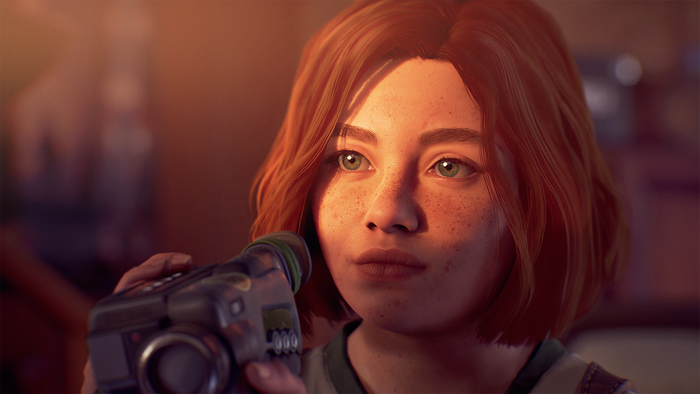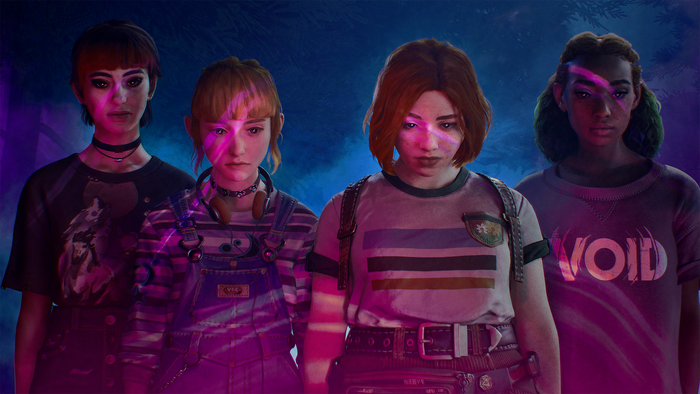Trending
Opinion: How will Project 2025 impact game developers?
The Heritage Foundation's manifesto for the possible next administration could do great harm to many, including large portions of the game development community.
Don't Nod Montreal's teen supernatural story Lost Records: Bloom and Rage shows why many game studios can't get much out of generative AI.

What game first comes to mind when you hear about French developer Don't Nod?
Is it one of the studio's narrative-focused titles like Life is Strange or Tell Me Why? Or is it one of the studio's action adventure games like Vampyr or the upcoming ghost hunting game Banishers: Ghosts of New Eden? Maybe it's Jusant, the tiny little rock climbing game that rocketed onto our list of the top games of 2023.
The studio has spent the last decade on an ambitious quest to juggle narrative-first titles with ambitious experiments in combat and gameplay, and with its 2020 expansion into Montreal, the company now has two physical locations to expand its steady stream of fresh experiments.
After a couple of years starting up the studio, Don't Nod Montreal finally revealed its first game at the 2023 Game Awards: '80s-inspired supernatural mystery Lost Records: Bloom and Rage.
If a teenage supernatural mystery sounds like the next version of Life is Strange, that's partly because it comes from two key lead developers on the original game: Executive Producer Luc Baghadoust and Creative Director Michel Koch. Both of them migrated across the Atlantic to become founding members of Don't Nod Montreal, and they recruited managing director Frédérique Fourny-Jennings to start development on the new game.
In an interview with Game Developer, the trio opted to keep details on designing Lost Records under wraps, but shared insights on what it's been like expanding the company into Montreal. The conversation turned into one about the pitfalls and possibilities about generative AI—but it was also an interesting chat about how it's always the people behind the game who will give it a sense of identity.
Raising the topic of generative AI with Baghadoust, Koch, and Fourny-Jennings lit a major fire under our pre-holiday, Friday evening conversation. An observer could have clearly seen we were all a bit worn out by the sprint to the end of the year, but jamming on what generative AI means for game developers suddenly brought out the hot takes and industry insights from all of us.
Baghadoust cut right to the core issue of the topic, which is that industry leaders are grappling with ever-ballooning game development costs. "Games cost a lot to make, iteration time is very long, and everyone wants their game to succeed so they can survive," he said. He said he understood why people would look for ways to improve their workflow, but said he's still "wary" about introducing tools into the production pipeline.
He admitted here that Don't Nod Montreal would probably be "the last studio" to use the technology when developing content for games.

Image via Don't Nod.
Games like Lost Records: Bloom and Rage don't benefit from quickly-produced (and often uncanny) content. Every environment the player traverses is loaded with art assets that tell small stories about the game world. The game's story often shifts direction with input from the voice actors, who grow to understand the characters they're playing alongside the writers.
And for writing itself—well, you can't make a game like Lost Records without a creative team that grew up obsessed with American TV shows like Twin Peaks and Buffy The Vampire Slayer. "A lot of my creative fuel came from watching a lot of American culture, even if we have a lot of great [media] in France," Koch said.
The pair also expressed wariness over the legal murkiness of AI-generated content. With multiple lawsuits filed against generative AI developers and still-gestating regulatory guidelines on what AI creations can be copywritten, any developer leaning too far into the bubble may find themselves spending too much time in court if they land on the wrong side of the law.
But! Koch shone some light on where generative AI is helping the studio. The team has been using image-generating tools to speed up the concepting process for Lost Records, with team members using it to better communicate the ideas inside their head. Koch—who's a former illustrator and has deep experience with the concepting process—said that tools like Midjourney have a role in the "mood board" stage of concept design, because previously he and his colleagues would build such image references by digging through Google Images to find the right photo reference they needed.
AI tools can't fully replace the process. He pointed out that quick sketches—even by people on the team who lack drawing skills—can communicate many ideas faster than trying to hash out a pose in Midjourney. "It still takes a long time," he said. "It doesn't take as long to get what you want with good artists that will give you better value. There's still a lot of chaos and randomness you get with AI tools."
Baghadoust observed that there a lot of "wrong opportunities" in generative AI, because toolmakers or investors often don't have direct experience developing games. "People might be interested to invest in AI stuff, and I see a lot of things that make it look like it will be a good opportunity...but when you don't have the experience of working on games, you might be as an investor tempted to invest in these projects.
"I'd be very wary with my money if I was an investor right now."
Fourny-Jennings was the one to point that that when making games like Lost Records, the "people element" of game development goes well beyond key creatives on a team. "When I started playing, Don't Nod games [were] also the bridges between [the stories] in the games and what we were living in our studios," she said. "We are building our games with real people."
With "real people" come "real conversations." Not just the ones developers have in meetings, but the informal ones that pop up in the studio hallways, at the lunch table, or while shooting the shit at your desk. (Was this a soft pitch for in-office work over remote or hybrid roles? Maybe, but Don't Nod's careers page has listings for remote-friendly positions)
AI evangelists do have a point when they talk about creative work requiring "good taste," but people with good taste can be tricky to come by and retain in game development. The managing director explained that establishing a studio in Montreal has required a different strategy compared to its home base in France, mainly because in the development-heavy providence of Quebec, it's much easier to find new work if you're not satisfied with your current gig.

Image via Don't Nod.
When you're in the position of starting a new studio, she said, you can set the value pillars you want but you can't guarantee exactly what the company culture will be. "I don't have a cocktail recipe in my back pocket for what's going to be the role, what's going to be the studio, what's going to be the culture. It's going to be something we brew together, and we need to make sure we are clear on the ingredients list."
Don't Nod's challenges even extend into the realm of language. Canadian Fourny-Jennings speaks French, just like Koch and Baghadoust, but it's not necessarily "the same" French because of the language has drifted in different directions in the two countries.
All that is to say that even if your game studio wants to follow Don't Nod's lead and slow your roll on adopting generative AI technology—you've got to make sure you're bringing the right people together on your team. Otherwise the seemingly quick-and-easy appeal of the technology may start to look more and more useful as development winds on.
You May Also Like